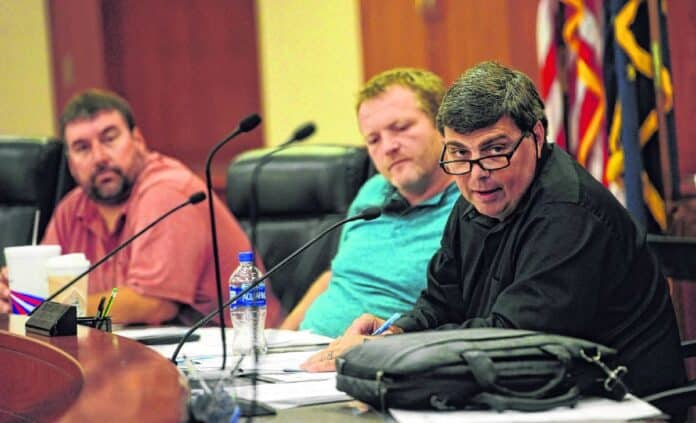
HANCOCK COUNTY — When the Hancock County commissioners held a meeting with members of the county council on Thursday, March 19, to update them on the coronavirus situation, members of the public and some county council members listened in by conference call. But with a mixture of in-person and over-the-phone cross-talk, it was difficult for those on the call to make out what was being said.
Now, the commissioners are planning to seek a better technical solution.
As experts advise social distancing to help minimize the spread of the coronavirus, local governments are working to find ways to balance public safety with public access and transparency.
Indiana Public access counselor Luke Britt recommended that non-essential meetings be postponed and essential meetings be limited to 50 people or fewer; attendees should also maintain physical distance from each other. Reduction of seating capacity will not be considered a violation of the state’s Open Door Law.
“These temporary recommendations may necessarily exclude some, but not all, members of the public for the duration of the emergency. A portion of those individuals present must include representatives from the media or the public. Nevertheless, agencies are urged to make all efforts to make accommodations ensuring the public’s right to observe and record meetings,” Britt’s statement said.
The statement encouraged governments to use technology to allow the public to view meetings remotely; and encouraged citizens to make use of that technology rather than attending meetings, especially if they belong to a group vulnerable to COVID-19.
Commissioner Brad Armstrong said the commissioners will try to limit their public meetings to 10 total attendees, following advice on the acceptable size of gatherings from President Donald Trump. He said the commissioners do not typically get a large number of people at their public meetings and that their meeting space is large enough for attendees to maintain distance from each other.
The commissioners plan to consult with county information technology staff on the best way for members of the public to call in to meetings.
“Obviously, public access and being transparent is important; public safety is also important,” Armstrong said.
Hancock County’s offices are still open, but not to the public — residents are being asked to conduct business over the phone, by email or by appointment. Department heads have been giving the discretion to ask employees to work from home or to send home employees who cannot, but will continue to get paid.
The county’s essential services, like law enforcement, are continuing, as is construction at the Hancock County Jail.
On Wednesday, Greenfield Mayor Chuck Fewell signed an emergency declaration closing the city’s offices to the public for one week. The policy can be extended by the Greenfield City Council. Business with the public will also be conducted through email, by phone, or by appointment.
Non-essential public meetings are being cancelled. Essential meetings, like those of the city council and board of works, will go forward. Attendance will be limited to 10 members of the public, with one seat being reserved for a member of the press.
“We have a community with a lot of elderly folks,” Fewell said. “Protecting the people is the most important aspect of doing this.”
As many residents will likely be out of work either because they have symptoms of illness and are self-quarantining or because their workplaces have closed, they may struggle to pay bills, including city utilities. Fewell said those facing financial hardship should get in touch with the Utility Office and work out a payment arrangement or other solution.
If that doesn’t work, Fewell said, they should call the mayor’s office.
“Certainly our intent is not to punish anyone for getting sick,” Fewell said.
Other town councils have also taken steps to make their meetings accessible remotely. New Palestine limited public attendance at its Wednesday town council meeting to 10 members of the public and live-streamed the meeting on Facebook. Cumberland, which also had a town council meeting Wednesday night, offered citizens the option of listening in via conference call.
